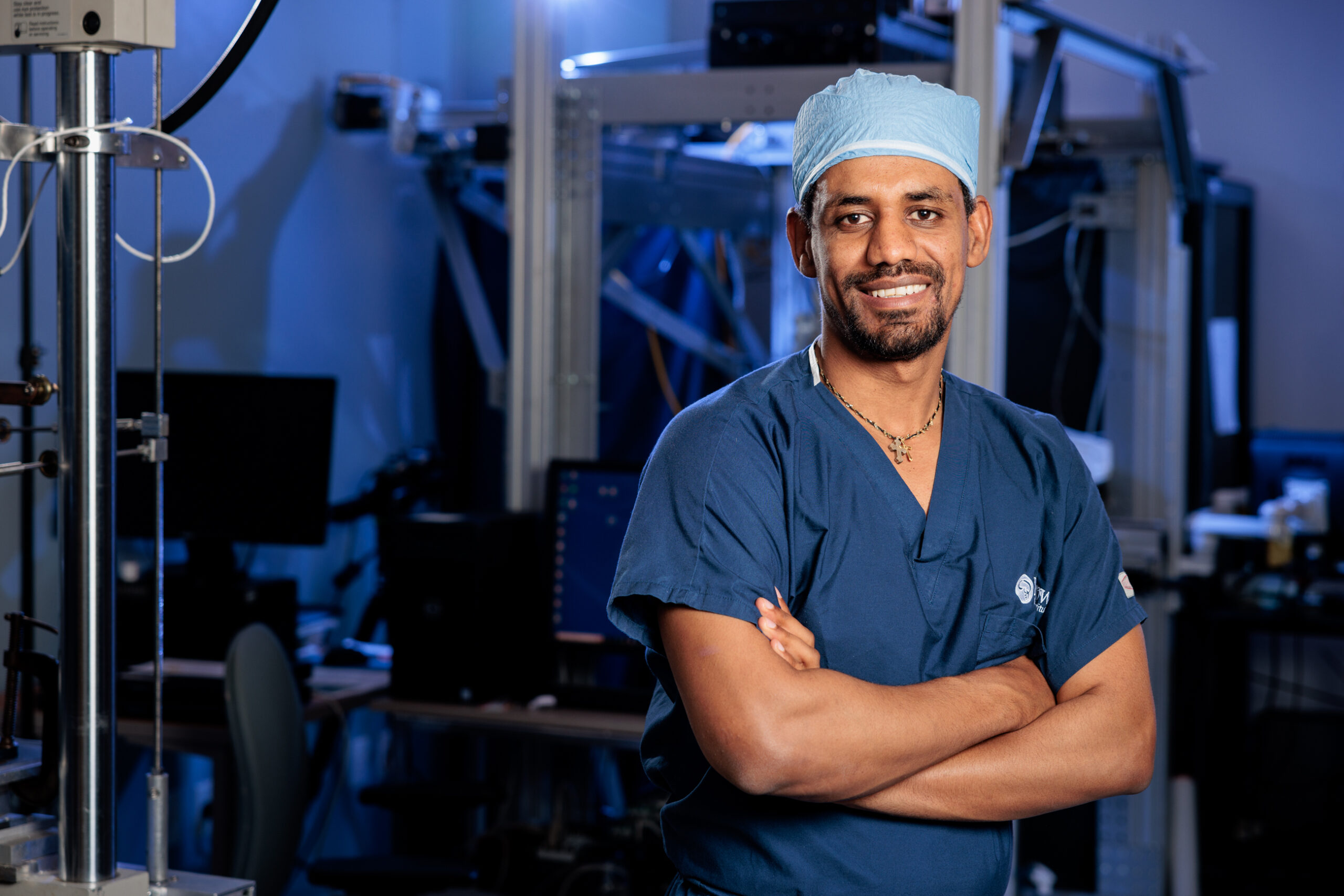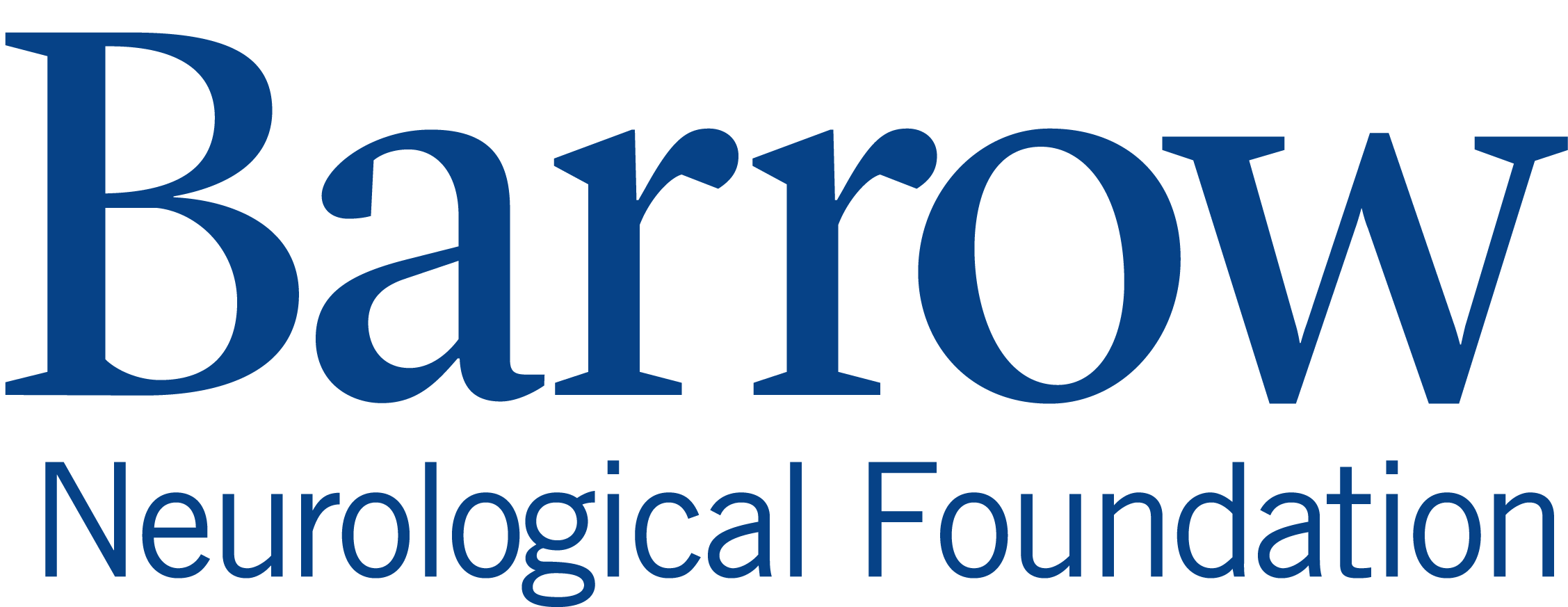
Barrow Welcomes First International Sonntag Spine Center Research Fellow

Temesgen Assefa, MD, has come a long way from the rural town of Mekane-Selam, Ethiopia, where he was raised. Growing up, both of his parents were farmers and, as one of ten children, he spent most of his time tending the land and raising cattle.
Dr. Assefa showed great academic promise from the time he first started school. He studied hard throughout the years and consistently earned top rank in his class. By the time he reached the end of secondary school, he had developed a deep passion for medicine, specifically neurosurgery.
Although the road was long and difficult at times, Dr. Assefa says becoming a neurosurgeon was one of the greatest decisions of his life and is grateful to all those who encouraged him. “The value of education in the mind of my parents, the constant support from my elder brothers and sisters (all of whom are college graduates), and the courage and hope from my former teachers have kept me driving to attain the position I am in today,” he says.
Filling a Gap in Global Neurosurgery
In 2006, when Dr. Assefa started medical school at the University of Gondar, Ethiopia had only three neurosurgeons for a population of more than 115 million. Dr. Assefa graduated medical school with distinction and spent several years working as a general practitioner and lecturer at Bahir Dar University in Ethiopia. During this time, he treated clinical and surgical patients, in addition to teaching medical students and advising medical interns.
Dr. Assefa then joined Addis Ababa University in Ethiopia for neurosurgery specialty training. He was an active neurosurgical resident, performing more than 700 procedures, most of which were unsupervised. As chief resident, Dr. Assefa had the opportunity to travel to Christian Medical College in India for three months. Here, he received surgical training utilizing modern medical technologies that were not available in Ethiopia. He also found inspiration in the advanced neurosurgical technologies of the Western world during this time.
“As a neurosurgical resident, I followed Barrow Neurological Institute on all the different social media channels and spent hours watching different neurosurgical videos, both brain and spine, as well as online lectures,” he says. “That’s how I came to learn that Barrow was one of the leading neurosurgical centers in the world.”
Dr. Assefa also learned that Barrow Neurological Institute had a robust clinical observer and visiting scholar program that provided international neurosurgeons the opportunity to travel to its campus in Phoenix, Arizona, to improve their understanding of what is possible in cutting-edge neurosurgery. “The other interesting part about Barrow is its focus on neuroscience research in its engagement of international doctors like me,” he says. “That kind of a program has a profound benefit for physicians all over the world.”
Upon learning of the International Sonntag Spine Center Research Fellowship, Dr. Assefa decided to apply right away.
Launching the Sonntag Spine Research Fellowship
The International Sonntag Spine Center Research Fellowship is a year-long training program in the Spinal Biomechanics Laboratory within the Sonntag Spine Center. The fellowship, which is a part of the Franke Global Neuroscience Education Center within the Barrow Global initiative, is funded through the generosity of Bill and Carolyn Franke.
As a platform for building neuroscience education programs in the developing world, the Franke Global Neuroscience Education Center offers global neurosurgery and research fellowships, as well as international clinical observerships, undergraduate internships, and mission trips.
“A fellowship is an invaluable opportunity for a neurosurgeon to dedicate their time to a special subject and to build a foundation of expertise in that area. I congratulate Dr. Assefa on being the first International Sonntag Spine Center Research Fellow at Barrow. I hope he is able to take the knowledge he has gained and advance the treatment of patients in his home country—both directly in his own cases and through sharing his expertise with his fellow neurosurgeons,” says Volker Sonntag, MD, emeritus professor of neurosurgery at Barrow.
Dr. Assefa feels honored to be the first International Sonntag Spine Center Research Fellow and is grateful to the Franke family for the opportunity to further pursue his passion for spine surgery and research. “As the first-ever Ethiopian neurosurgeon to come to the United States for fellowship training, this is a historical moment for me. I plan to make the most out of my time at Barrow,” he says.
In the Barrow Spinal Biomechanics Laboratory, Dr. Assefa has set up and effectively executed sponsored teaching and training laboratories, as well as implemented various study protocols. He also is working on several research projects, including a novel clinical trial for spinal cord compression, a project correlating the normal biomechanics of the cervical spine with different demographic variables, and a project investigating the different risk factors for segment degeneration after spinal fusion surgeries.
“Dr. Assefa’s academic orientation, strong work ethic, and extensive medical knowledge have already significantly contributed to our efforts,” says Brian Kelly, PhD, director of the Barrow Spinal Biomechanics Laboratory. “He is very actively engaged in Barrow resident-led studies, and over the course of these studies, his surgical skills have been invaluable, as he has been able to execute various different techniques.”
Implementing Advanced Techniques at Home
At Barrow, Dr. Assefa has been able to learn a variety of new, cutting-edge surgical techniques. For example, he received training in spine endoscopic surgical techniques for the first time and observed a novel technique to treat thoracic disc herniation performed by Chief of Spinal Disorders at Barrow, Juan Uribe, MD. He also has been awarded several scholarships to travel out-of-state for hands-on training courses. These include a cervical spine surgery course in Indianapolis, Indiana; a lumbosacral spine and sacroiliac joint surgery course in Atlanta, Georgia; and a spinal cord stimulation for pain management course in Austin, Texas.
“Barrow Neurological Institute is a great academic place and I have had the opportunity to receive training in a wide variety of different modern spine surgical techniques and research skills,” he says. “My goal now is to advance spine surgery, especially minimally invasive spine surgery, and research activities back in my home country.”
